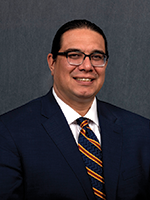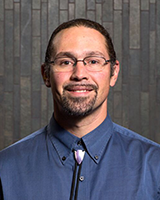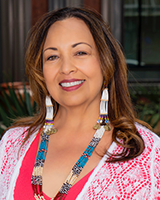
Kitcki A. Carroll is Executive Director for United South and Eastern Tribes, Inc. (USET). In this capacity, he fights to protect and promote the sovereignty of USET member nations. He is a strong advocate for all Indian people and actively works to ensure that the United States fulfills its trust responsibilities and obligations to Indian Country.
Prior to his work in Indian Country, he spent the first part of his career in the insurance and financial services sector. Mr. Carroll was born in Boston, Massachusetts and later moved to Omaha, Nebraska where he received his undergraduate degree in Finance with a minor in Native American studies from the University of Nebraska at Omaha.
Mr. Carroll is an enrolled citizen of the Cheyenne and Arapaho Tribes of Oklahoma and a direct descendant of Chief Black Kettle.

Wizipan Little Elk Garriot, an enrolled member of the Rosebud Sioux Tribe in South Dakota, is the Principal Deputy Assistant Secretary – Indian Affairs in the U.S. Department of the Interior. He was appointed to this role by Interior Secretary Deb Haaland in October 2021. He serves as the first assistant and principal advisor to the Assistant Secretary – Indian Affairs in the development and interpretation of policies affecting Indian Affairs bureaus, offices, and programs. Mr. Garriott’s previous federal service included serving under the leadership of Assistant Secretary – Indian Affairs Larry Echo Hawk from 2009 to 2011.
Prior to his appointment, Mr. Garriott served as chief executive officer from 2012 to 2021 of the Rosebud Economic Development Corporation (REDCO), an ecosystem of Tribal organizations serving the Rosebud Indian Reservation. In this capacity, Mr. Garriott led and started businesses and community-based programs, including a Native language immersion school and 1,500-head buffalo herd.
Mr. Garriott was born and raised on the Rosebud Indian Reservation where he attended St. Francis Indian School, a Bureau of Indian Affairs (now Bureau of Indian Education) facility. In 1998 he received the National Indian School Board Association’s Student of the Year Award. Following high school, Mr. Garriott became the first BIA student to attend and graduate from Yale University, where he also was the first student to use an Indigenous language – Lakota – to complete a foreign language graduation requirement. In 2003, he received a Bachelor of Arts degree in American Studies.
In August 2003, Mr. Garriott joined the Washington, D.C., office of then-Senate Minority Leader Tom Daschle of South Dakota as a staff assistant. He went on to serve as Special Assistant for Indian Affairs and Economic Development, advising on various issues impacting Tribal communities including agriculture, health care, housing, and renewable energy development.
Mr. Garriott received his Juris Doctor degree in 2008 from the University of Arizona’s James E. Rogers College.
Mr. Garriott is part of the Aske Gluwipi Tiyospaye (They Wrap Their Hair) family clan of the Sicangu Oyate (See-con-zhu Oh-yah-tay) or Rosebud Sioux Tribe. His name, from his grandfather who lived six generations before him, has three meanings: a parfleche to carry sacred objects, a great burden or life calling, and the sacred Black Hills of the Lakota. Mr. Garriott lives on the homelands of the Sicangu with his wife and four children.

Joel Dunn is President and CEO of Chesapeake Conservancy, a non-profit organization based in Annapolis, MD dedicated to protecting Chesapeake landscapes that are vital to the health of the Bay and its cultural heritage. Dunn leads the Conservancy’s efforts to strengthen the connection between people and the Chesapeake Bay watershed as a way to promote a greater appreciation for the need to conserve the landscapes and special places that sustain the Chesapeake’s unique natural and cultural resources. Dunn earned a Master of Public Policy from the Terry Sanford School of Public Policy at Duke University and a Master of Environmental Management from the Nicholas School of the Environment and Earth Sciences from Duke University, where he was a Doris Duke Conservation Fellow. He holds a Bachelor of Science from The Evergreen State College.

Marion Werkheiser is an award-winning lawyer and internationally recognized trailblazer in the cultural heritage field and is co-founder of the law firm Cultural Heritage Partners, PLLC. Her well-established practice is firmly rooted at the intersection of preservation and development. She has a proven track record of convening diverse stakeholders to identify shared values, solve tough problems, and scale solutions. She serves as general counsel to multiple federally recognized tribes, handling a wide array of issues including governance, economic development, federal funding compliance, sacred site protection, and child welfare. She represents tribes in consultations with federal and state agencies, negotiates avoidance and mitigation for cultural heritage impacts, and advises tribes on developing their own consultation and engagement protocols.
Marion earned her J.D. from Harvard Law School and is licensed to practice law in California, Virginia, and the District of Columbia. She is a Phi Beta Kappa graduate of Indiana University, where she was a Wells Scholar and earned her B.A. degree in political science and classical civilization with an emphasis in art and archaeology. The Register of Professional Archaeologists honored Marion with the John F. Seiberling Award for her significant and sustained efforts in the conservation of archaeological resources.

Zoe Yuki Goozner is a Kyoto-born marine conservationist with the Pew Charitable Trusts. Her work has focused on Caribbean coral reef restoration, US South Atlantic fisheries management, and US mid-Atlantic oyster reef conservation.
Zoe uses her Western-academic field science background as fuel for her strong and growing passion for creating informal educational spaces to increase inclusivity, using storytelling to amplify peoples’ lived experiences, and developing visual content to help explain nuanced scientific and policy-based concepts.

Dr. Casey Thornbrugh serves as the Tribal Climate Science Liaison with United South and Eastern Tribes (USET) and the Department of the Interior’s Northeast and Southeast Climate Adaptation Science Centers (NE/SE CASCs). Dr. Thornbrugh also serves as USET’s Climate Change Program Manager, providing climate change adaptation planning technical support to Tribal Nations in the USET region.
He is a citizen of the Mashpee Wampanoag Tribe and has an educational background in geography and climate science from the University of Arizona. Dr. Thornbrugh previously taught weather, climate, and geography courses at Tohono O’odham Community College, the Tribal College serving the Tohono O’odham Nation located in southern Arizona, USA and northern Sonora, Mexico. He also served as the Director for the Natural Resources Department of his Tribal Nation, the Mashpee Wampanoag Tribe located on Cape Cod, Massachusetts.

Principal Chief Lora Ann Chaisson, United Houma Nation is a current resident of Point aux Chene, LA, and the daughter of Theo Chaisson and the late Betty Sanders Chaisson. She is the United Houma Nation’s National Congress of American Indians (NCAI) Alternate Delegate as well as the Southeast Regional Alternate Vice President to the NCAI Executive Committee. She is also a current member of the United States Department of Labor Native American Employment and Training Council as well as a Board Member and Treasurer for the American Indian Alaska Native Tourism Association. Locally, she is an appointee to the Lafourche, Assumption, and Terrebonne (LAT) Workforce Board.
Chaisson is employed as a Vice President of Tribal Solutions Group. Her work with Tribal Solutions Group encompasses a variety of divisions with solution-based services in areas such as education, gaming, medical, and broadband/communications specifically for tribal nations, entities, and enterprises. Previously, she worked with the Inter-Tribal Council of Louisiana and the Institute for Indian Development within both the domestic violence and the workforce development programs. Lora is also an alumnus of the American Indian Opportunity Ambassador Program – a national organization providing capacity building and leadership development for Native American professionals looking to grow their communities.

Daniel Cordalis is a member of the Navajo Nation, a natural resources and Indian law attorney, and a native of the Colorado River Basin. He has worked in private and nonprofit law practice to protect Tribes’ water, natural, and cultural resources through litigation, resource negotiations, land acquisition, and tribal governance and land management initiatives.
Daniel’s work has focused on the Klamath River Basin and the Colorado River Basin. He recently left his position as Deputy Solicitor of Water Resources at the Department of the Interior to reengage in work on behalf of Tribal nations. Daniel is married to a Yurok woman and has three wonderful young boys
